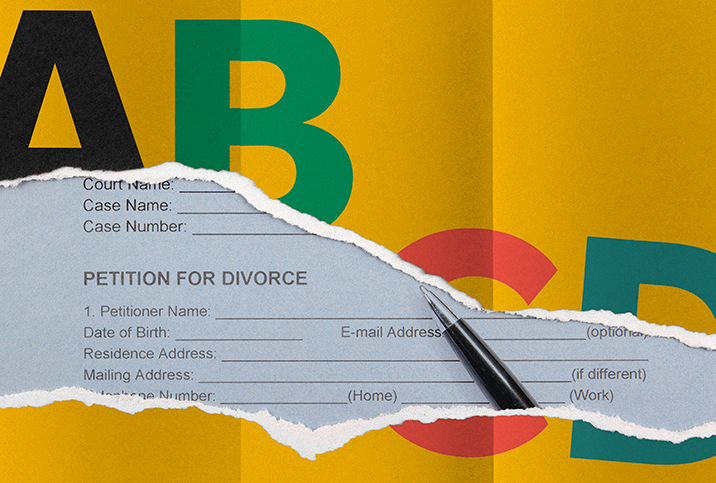Is Legal Separation or Divorce Better for You?

Maintaining a happy marriage is never easy. It takes effort to find and sustain a delicate balance emotionally, sexually and mentally for a long-term relationship to work between two people. Sometimes that balance is impossible to achieve. In some instances, no matter how much hard work is put in, the bond between a couple becomes untenable for one or both parties.
For some people in this situation, divorce is the best option, but for others who are reluctant to file for divorce because of children, religious beliefs or uncertainty, a temporary break could be the right move.
We spoke to a divorce lawyer and a counselor who specializes in working with separated and divorced couples to better understand what you have to be prepared for physically, emotionally and mentally when undergoing separation.
Physical separation or legal separation?
There are two types of separation, physical and legal, according to Cary Mogerman, the principal attorney at Carmody MacDonald in St. Louis and president of the American Academy of Matrimonial Lawyers.
A couple who is physically separated is still legally married without the benefit of any legal pronouncement from a court.
"There is no particular legal significance to that status in most states," Mogerman explained, because in the eyes of the law, the couple is still married. A possible scenario for why a couple would choose physical separation "could be that they are taking the time apart to decide whether they want to remain married and felt a physical separation would allow each the peace of mind and contemplative time to evaluate the future," he added.
On the other hand, a legal separation requires a lawsuit and the judgment of a court, similar to a divorce, Mogerman explained.
"In [many] states, obtaining a legal separation is in many respects the exact same process as obtaining a divorce," he said. "However, at the end of the case, the parties are 'legally separated' and not divorced. Nevertheless, their property has been divided between them, their financial obligations have been expressed by the court and their financial life together is concluded. Also, a parenting plan is part of a legal separation if children are involved, just as if there were a dissolution of the marriage."
Mogerman explained why some couples opt for legal separation.
Every couple has specific, unique circumstances that could result in them choosing to be legally separated rather than divorced.
"It may be that the parties have religious convictions which make it such that a dissolution of their marriage is unacceptable or not desired," he said. "It may also be that the parties wish to remain married and perhaps even continue to cohabitate, but do wish to separate their financial lives. This could be due to perceived financial irresponsibility on the part of one of the parties or it could be for other reasons particular to the parties' own specific circumstances.
"Before medical insurance was as accessible as it is today, at one time legal separation was also possibly a method by which the parties could continue coverage for a particular preexisting health condition of one of them that would not have been covered, or for which coverage could not be obtained, if the parties were divorced," he added.
These are common scenarios, but every couple has specific, unique circumstances that could result in them choosing to be legally separated rather than divorced.
"It could be just as simple as both parties believing it is preferable, perhaps for the sake of their children or some other personal reason," Mogerman noted.
Jennifer Meyer, M.A., a licensed professional counselor in Fort Collins, Colorado, who runs her own counseling practice and provides divorce recovery counseling, said she often sees couples opting for separation instead of divorce in some of (but not limited to) the following scenarios:
- They aren't completely sure they want a divorce.
- They don't have the option to move out financially, in which case, one partner may move into a different bedroom or different level of the house.
- There are current mental health or substance use issues occurring in one or both partners.
- In cases where the couple is locked into a difficult cycle of conflict, they just need a break from each other to discover whether they still have any fond feelings for each other.
"In general, I've found that couples fear separation and assume it will lead to divorce," she said. "In my experience, most couples opt for separation only as a last resort or at the recommendation of a therapist."
At times, separation can also be chosen for practical reasons such as maintaining health insurance, not having the money to create two separate households or religious objections to divorce, she added.
Separation can also mean healing
If a couple is unsure about filing for divorce, a physical separation could potentially be a time of healing.
"Therapists sometimes use a term called 'healing separation,' which is a physical separation for a period of time that allows a couple the chance to get some space from each other as well as the cycle of conflict and other mental health or substance abuse concerns," Meyer said.
"This temporary separation is detailed, intentional and preplanned, giving both partners the space and time to gain perspective and work on themselves individually," she continued. "A healing separation agreement usually includes what each partner will do to work on her-/himself during the separation, with the possibility of reconciliation at the end.
"A healing separation agreement may [also] denote that both partners seek individual therapy [and] see each other for a date night or a time to discuss what they're each working on, and could spell out that neither partner is to communicate with potential dating partners, for example," she added.
Meyer shared that during physical separation, the couple may feel lonely and miss each other, or one or both partners may realize they have fallen out of love and can't return to the relationship.
"Sometimes a separation can cause couples to wake up and see their relationship in a new light, and they're able to see their own part in contributing to the problems," she said. "If this is the case, these insights can be used in couples counseling to improve their relationship."
Meyer also practices discernment counseling for couples with one partner who is "turned outward." This means they are not sure they want to remain in the marriage, while the other partner is interested in doing therapy to maintain the marriage. This form of counseling allows the couple to work toward a clearer course of action.
"When this is the case, I generally do up to five sessions with them, without pressure to stay together, to discuss their issues, goals, etcetera," she said. "The three options for a couple's future according to this approach are: status quo, continue as-is in the relationship; separation or divorce; or commit to six months of couples counseling aimed at the issues identified in the sessions. If done intentionally and for the right reasons, separation can actually create some space, insight and hope to redirect couples in a bad spot."
Implications of separation
"One of the biggest benefits of choosing a separation first is that it can create a break in the conflict and give each partner a chance to find peace, perspective and possibly even miss each other," Meyer said.
However, she added that there are certain practical issues that should be hammered out before separation: who pays the bills, parenting time with each child, who takes care of the pets, and what kind of communication you should have and when.
"If these issues aren't discussed prior to the separation, the couple often continues communicating about these stressful topics when they're supposed to be taking a break," Meyer explained.
During separation, it is important to choose what kind of communication works best for you.
"Some couples choose to meet weekly during a separation to discuss what they're working on individually in therapy or to do a family date if they have kids. Some choose to read a book on marriage during their time apart and discuss [it] when together," Meyer noted.
"These approaches can be really helpful, but only if both partners are open to spending time with each other," she elaborated. "If one or both partners really needs a break from the marriage and hashing things out, in this case, even a weekly meeting can feel overwhelming."
There is also the complication of what you want to communicate to family members and friends.
During separation, it is important to choose what kind of communication works best for you.
"Decide together what you will tell others during this time of separation so that you can maintain some privacy and space to work on yourselves without the judgment or comments of others, or people jumping to take sides," Meyer advised. "Others don't need to know all of the details."
There are legal implications to consider, too, when deciding between the two forms of separation.
"It is important to realize that physical separation alone does not change the parties' status as married individuals, and whatever joint financial obligations they have will continue to exist irrespective of their living apart," Mogerman said.
"If their financial life together is tumultuous and one desires financial protection from the other, one must seek a legal separation or divorce in order to have access to the assistance of the court and seek a temporary financial order and other temporary protections that a court can provide, but which do not exist without a court order," he explained. "The same may be true of parenting time and parenting decisions.
"If the parties are unable to agree on these things, there is little to nothing that can be done [in the] absence [of] the involvement of a court through the filing of a legal separation or dissolution of marriage," he continued. "The pending lawsuit is what provides a party with the protections of a court order."
Mogerman also shared that there is often little difference, legally, between legal separation and divorce.
"Generally, my advice to individuals who cannot live together and perhaps don't trust each other financially is to proceed with the divorce," he said. "In my state [Missouri], legal separation can be changed unilaterally by a party even if that was the original agreement. Therefore, there is little to be gained in a legal separation unless both parties believe it to be the preferred outcome.
"One who is legally separated may unilaterally move to convert the judgment of legal separation to a dissolution of the marriage once 60 days have elapsed after the judgment of legal separation has been granted," he continued. "Therefore, it is not within the control of the other party whether or not the legal separation remains the status, so I see little utility to it."
Seek legal counsel in your own state of residence so both individuals understand the implications of separation.
How you can cope during and after separation
If you're currently going through separation or plan to in the near future, Meyer shared three tips for planning and coping during this difficult period:
1. Give yourself time and space to reflect, learn and heal
"Allow yourself the time and space to look inward, learn about yourself and how you may contribute to the issues in your relationship, and also take really good care of yourself," she said. "Separation can be really hard on people. Suddenly, you're on your own for the first time in maybe years and trying to figure out how to do all of these things your partner used to do."
2. Avoid getting into another relationship immediately
"As tempting as it may be to start dating someone new during or after a separation, I'd advise that you take this time for yourself to truly figure out what you want without the distraction of another person," Meyer said. "You haven't healed fully from your marriage yet, and if you do get hurt emotionally, it will be a very deep hurt. Plus, if you do go through a divorce, adding another person to the mix tends to add a bunch of gasoline to an already explosive situation."
3. Seek external help and support
It's important to allow people to help you during a separation.
"You may be feeling very lonely and/or shame for not being able to figure out your relationship," Meyer said.
"I remember being separated for a time and feeling like my whole future was up in the air. It was really helpful to spend time with friends and family who were supportive and insightful, and who would listen and help me do things," she continued. "For example, they'd offer to watch my kids, have me over for dinner or help me fix something that had broken around the house.
"Now is not the time to go it alone," she added. "You have enough on your plate."
Consider seeing a therapist who specializes in couples, relationships, separation or divorce to help you assess your options and offer support.
"Try to take some responsibility for your part in the relationship, but not all of it. Ask yourself if you want to be in this relationship and, if so, are you willing to put in the work?" Meyer said. "If you've realized this relationship is not good for you, make sure you have personal and professional support for the next steps."




















